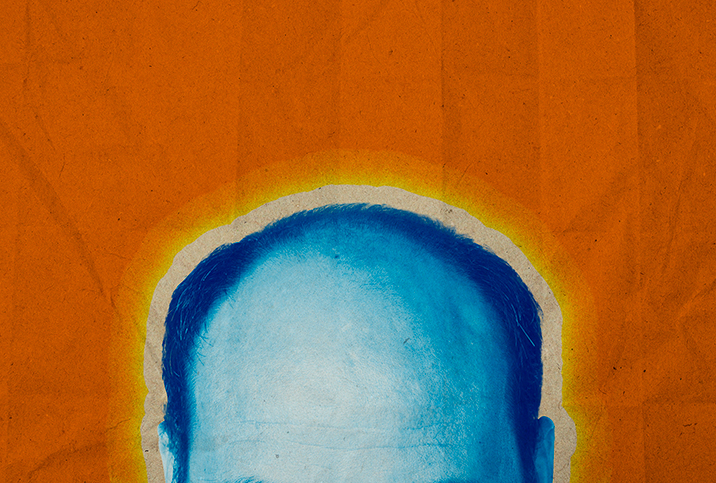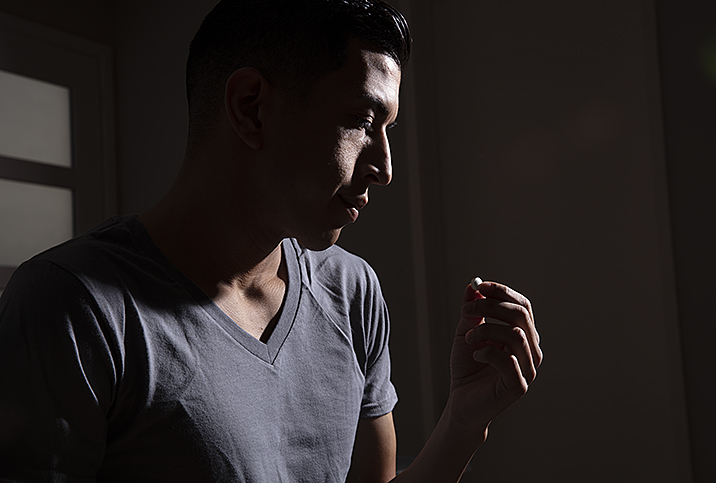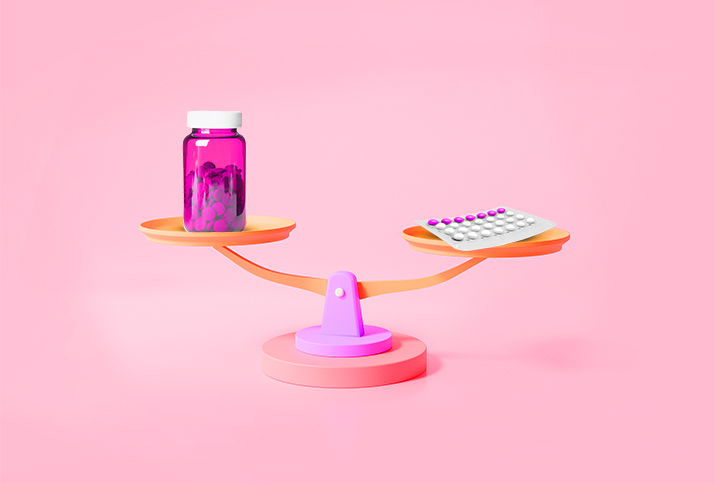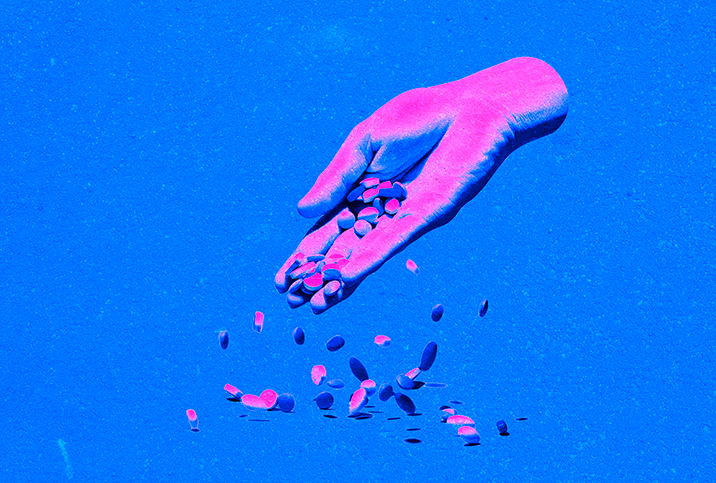Which Drugs Can Lead to Erectile Dysfunction?

Have you ever watched the end of a pharmaceutical commercial—the part where a litany of possible side effects scroll across the screen—and thought the side effects sounded worse than the condition the medication was intended to treat?
Of course, we all know that pharmaceutical companies are making these lists to avoid litigation, even when the probability of certain side effects is low. However, it's still possible for medications meant to manage or cure one health issue to uncover, or cause, another.
Unfortunately, there's no simple way to know how a certain medication will affect your body, including your sexual function. Not only do we each experience medications differently, but sexual function also is dependent on many systems in the body working together.
"The problem is that once you start tinkering with one, you can have a problem there, but you can also have a cascade effect," said Elisabeth Gordon, M.D., a sexual health psychiatrist based in New York City.
For example, she mentioned the use of antihistamines. Just one dose of an antihistamine dries up the mucosal membranes in your nose. But at the same time, it dries up the mucosal membranes throughout your body, too, which can lead to problems with lubrication. If you're using medications like these on a long-term basis, problems with sexual functioning can snowball.
"None of these health systems are independent and they have a massive impact upon each other," Gordon explained. "Mental health, physical health, sexual health, relational health, social health, community health…they all have interactions and impact each other."
Drug types that can lead to sexual dysfunction
While it's hard to predict whether a medication will lead you to experience problems with sexual function, there are certain drug classes known to be more likely than others to rock the boat. Here are some of the most common culprits:
Antiarrhythmics
Antiarrhythmics are medications used to prevent and/or treat irregular heart rhythms. One recent analysis indicated 43 percent of patients with congenital heart disease suffer from erectile dysfunction (ED). While multiple factors could be the culprit for this propensity of ED, antiarrhythmic drug therapy is one possible cause.
Antihistamines
Antihistamines can affect your lubrication levels, but that's not their only connection to sexual dysfunction. Histamine is a compound that plays many roles in the body, including its role in sexual arousal. Thus, the use of antihistamines can cause reduced sexual desire, ED and other types of sexual arousal disorders.
Antidepressants and antipsychotics
As with most medical conditions, when it comes to mental health and sexual dysfunction, it's difficult to know the primary culprit. Research indicates that various mental health medications can have an adverse impact on sexual function.
Selective serotonin reuptake inhibitors (SSRIs), the most commonly prescribed antidepressants, increase levels of serotonin in the brain, a chemical that regulates mood. This increase can have an impact on your hormones and neurotransmitters, such as testosterone and dopamine.
Testosterone can affect arousal, and dopamine has a part in achieving orgasm, so SSRIs may lead to reduced sexual desire and anorgasmia, that is, delayed, infrequent or absent orgasms—or significantly less intense orgasms—after arousal and adequate stimulation. Tricyclic antidepressants can lead to decreased libido.
For more severe mental health issues, some doctors prescribe antipsychotics, which block dopamine and increase prolactin. This action can lead to ED, reduced libido, priapism (a prolonged erection), difficulties achieving orgasm and more.
Antihypertensives
Antihypertensive medications are intended to lower the pressure inside your blood vessels so your heart doesn't have to work as hard to pump blood throughout your body. As with most of the conditions on this list, high blood pressure can cause sexual dysfunction, but so can the drugs used to treat it. The decrease in blood flow caused by antihypertensives can reduce desire and cause erectile dysfunction, vaginal dryness and anorgasmia.
Anti-seizure medications
Anti-seizure drugs are used to treat epilepsy and work by preventing impulses from traveling along your nerve cells. When your body's response to sensation is dulled, it becomes much more difficult to find pleasure from the usual sources of stimulation.
Birth control
Research indicates some hormonal birth control methods can cause decreased libido. While researchers still aren't sure why, many believe it's because of a decrease in sex hormones such as androgens, including testosterone, which can reduce your sex drive.
Cancer treatments
Cancer can indirectly cause sexual dysfunction, particularly because of the psychological impact of a diagnosis. However, the medications used in treatments are just as culpable. Chemotherapy and endocrine therapy—which are estrogen-blocking medications—can force estrogen levels to plummet, putting patients into early menopause, which can lead to vaginal dryness, painful sex and decreased libido.
Statins
Statins are used to treat high cholesterol but because they limit the availability of cholesterol, which is a building block of hormones, they can impact the production of testosterone, estrogen and other sex hormones. This can cause problems with sexual function, leading to issues such as ED and anorgasmia.
We could go on with this long list, but instead, let's briefly touch on what you can do if you're experiencing medication-induced sexual dysfunction, no matter which medication you're taking.
How to manage medication-induced erectile dysfunction
What do you do when a medication you're taking for one health issue seemingly causes yet another?
Gordon explained that she doesn't believe this is a question anyone should try to answer on their own. She recommended working with your healthcare practitioner—or a team of medical professionals—before deciding how to proceed.
Kristin E. Rojas, M.D., a breast cancer surgeon who runs the Menopause Urogenital Sexual Health and Intimacy Clinic (MUSIC) at the Sylvester Comprehensive Cancer Center in Miami, agreed that a process of shared decision-making is essential.
"The medications and regimens we're prescribing for patients have a lot of side effects, but we're fighting a silent and deadly enemy," she explained. "Let's work together. What is absolutely the most heartbreaking thing is when we lose those patients [who refuse treatment] and then they come back and they're no longer curable."
In the end, it's all about weighing how detrimental the potential illness is versus how detrimental the impact on your sexual health is, Gordon noted.
While healthcare professionals should check a treatment's impact on sexual health, it's often up to patients to address the topic. If you're concerned about a medication's possible impact on your sexual function, it can help to arrive at your next medical appointment organized and ready:
- Prepare a list of concerns and questions before you arrive.
- Consider scheduling extra time or even making a separate appointment.
- Take notes while you're there, or bring a friend or a partner to help remember what your healthcare provider said.
If all else fails, ask for a referral or seek a specialist on your own. Sources of sexual health professionals include:
- American Association of Sexuality Educators, Counselors and Therapists (AASECT)
- Society for Sex Therapy & Research (SSTAR)
- International Society for Sexual Medicine (ISSM)
- International Society for the Study of Women's Sexual Health (ISSWSH)
- Sexual Medicine Society of North America (SMSNA)
Once your doctor is aware of your concerns, there are several paths you might take together.
Advocate for your sexual health
Patients often must advocate for their own sexual health concerns.
"This remains more of an art than a science," Gordon said.
Doctors should already be prescribing medication with the lowest incidence of sexual dysfunction and encouraging lifestyle adjustments such as diet, exercise and sleep hygiene to support patients' best sexual health while also mitigating their other health concerns. But if problems crop up, you're not out of options.
"You can reduce the medication you're taking to the lowest effective dose," Gordon said. "And if that doesn't work, you can try switching to another medication from the same class. You can also use other medications to counter the effects of sexual dysfunction."
You can try sex therapy, mindfulness, cognitive behavioral therapy (CBT) or psychotherapy. There are also mechanical interventions, such as penis pumps and vibrators.
Both Rojas and Gordon were adamant that patients should advocate for their sexual health so they don't have to grapple with the problems alone.
"It's often thought that if you're not feeling good, you're not going to want to have sex," Gordon said. "Or if you're tired, you're not going to want to have sex. But research shows that there is a bidirectional relationship."
Gordon referenced a study indicating that while major depressive disorder can increase the risk of sexual dysfunction by 50 percent to 70 percent, sexual dysfunction can increase the risk for major depressive disorder by 130 percent to 210 percent.
"So it really is important to remember how important sexual health is to your mental health, physical health and relational health, and to understand that when you're having problems sexually, it can negatively impact the rest of your health," Gordon said, reiterating the importance of bringing up issues with your healthcare provider.
"If I'm a provider and I have one patient bring up her sexual health concerns and I don't have a resource for her, I may not think about it later," Rojas said. "But if I'm in a clinic one day and I have four patients bring this up, I'm going to go home and I'm going to find the resources for those patients and I'm going to make sure they're available for them next time that I see them."


















